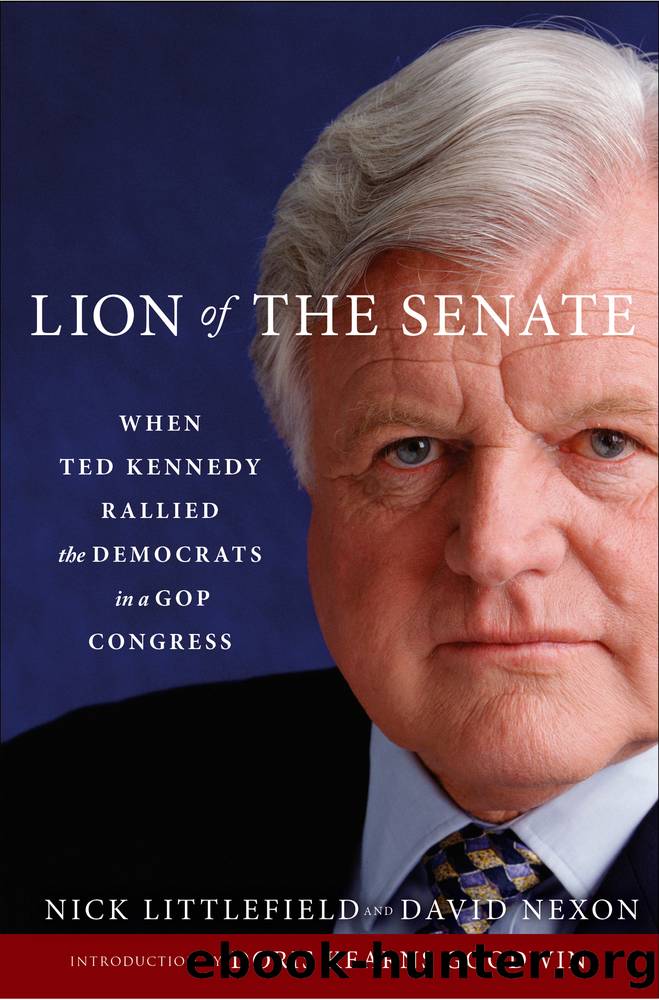The Lion of the Senate by Nick Littlefield

Author:Nick Littlefield
Language: eng
Format: epub
Publisher: Simon & Schuster
THE SEARCH FOR ONE “BIG IDEA”
On October 16, in preparation for the pending budget impasse, Kennedy invited several political consultants to his home to discuss the Democratic strategy. (The final House reconciliation bill was finally introduced the next day.) These discussions revealed that the party still wasn’t unified on whether to fight back against the Republican revolution or make a deal. This division reflected the president’s own divided mind and the ongoing argument within the White House. Kennedy, however, was looking ahead. He believed Democrats were on firm ground in opposing the Republican revolution and standing up for their traditional values but that they ultimately needed a clearer agenda of their own.
Kennedy insisted that he and our liberal allies needed to do everything possible to strengthen the president’s resolve, to show him that the best way to close down the Republican revolution was to stand our ground in opposition to it. Democrats had to stand for progressive change, what his close friend and political strategist Bob Shrum called “the big idea.” All the work that had been done over the summer to highlight the extreme measures proposed by the Republicans for Medicare, nursing homes, education, and the environment had helped educate the public. But we still needed a dramatic event that would be a tipping point.
Robert Reischauer, former director of the Congressional Budget Office, a moderate Democrat and cautious Washington insider, was sometimes at odds with Kennedy and Senate liberals. He said that Republicans had to pass the reconciliation bill they’d been promising to pass all year so that they could say they had done what they said they would do. He expected the president would veto the bill because the tax cuts were too large. Then negotiations would start between the White House and the Republicans in mid-December. Reischauer predicted that in December the president would want a budget bill. Once he vetoed the first bill, he would have the high ground, and he would then want to show that he could make a deal.
Barney Frank, who later became chairman of the House Banking Committee and one of the two chief architects of the Dodd-Frank financial reform bill, said Clinton would end up signing a reconciliation bill, but under protest, and would make it the theme for 1996 that he went along with this terrible budget in order to keep the government from closing down. Whether or not this worked in the election, the country would be left with a terrible set of policies.
Robert Shapiro was a former Moynihan staffer then with the centrist Democratic Leadership Council and the Progressive Policy Institute, its think tank arm. He said the worst outcome for Democrats and for the economy would be to have no reconciliation bill. That would confirm to the American people the truth about Washington gridlock. Shapiro thought we needed to focus on the cuts the country didn’t like, but that we also needed to show that we had our own cuts, our own ability to restructure government, and our own way to reform the health care system.
Download
This site does not store any files on its server. We only index and link to content provided by other sites. Please contact the content providers to delete copyright contents if any and email us, we'll remove relevant links or contents immediately.
The Secret History by Donna Tartt(16623)
The Social Justice Warrior Handbook by Lisa De Pasquale(11489)
Thirteen Reasons Why by Jay Asher(7788)
This Is How You Lose Her by Junot Diaz(5772)
Weapons of Math Destruction by Cathy O'Neil(5037)
Zero to One by Peter Thiel(4824)
The Myth of the Strong Leader by Archie Brown(4789)
Promise Me, Dad by Joe Biden(4447)
Beartown by Fredrik Backman(4419)
Stone's Rules by Roger Stone(4415)
How Democracies Die by Steven Levitsky & Daniel Ziblatt(4399)
The Fire Next Time by James Baldwin(4343)
100 Deadly Skills by Clint Emerson(4078)
A Higher Loyalty: Truth, Lies, and Leadership by James Comey(4033)
Rise and Kill First by Ronen Bergman(4012)
The David Icke Guide to the Global Conspiracy (and how to end it) by David Icke(3882)
The Farm by Tom Rob Smith(3872)
Secrecy World by Jake Bernstein(3782)
The Doomsday Machine by Daniel Ellsberg(3731)
